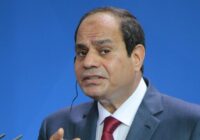In this edition of The Interview, Fair Observer talks to award-winning journalist James Dorsey.
To millions around the world, football is a religion. Countries bicker and fight to host the World Cup. Organizations like FIFA rise and fall in the face of never-ending corruption scandals. The last thing anyone might associate “the beautiful game” with is the unpredictable world of politics.
To investigative journalist James M. Dorsey, however, the millions of fans who worship the sport are exceptionally integral to this world. Their loyalty, unity and devotion to football clubs are part of the larger architecture of politics and authoritarian regime resilience in the Middle East.
Having spent the last four decades covering ethnic and religious conflict and major events of the 20th century in the Middle East, Africa, Asia, Europe and Latin America, Dorsey’s recent endeavors have proved to be more academic as a senior fellow at the S. Rajaratnam School of International Studies in Singapore, and co-director of the Institute of Fan Culture at the Julius Maximilian University of Würzburg in Germany.
His chief focus has been his widely acclaimed blog, The Turbulent World of Middle East Soccer, and a soon to be published book of the same name, which explores how football has shaped Middle Eastern politics and vice versa.
This link became explicit in the form of the Arab Uprisings in 2011, which Dorsey explains in his blog and book about how Egyptian ultras—hardcore football fans who have had tense relations with the police and the regime since the late-2000s—aided the uprising against former President Hosni Mubarak. They protested military ownership of football clubs by mobilizing thousands, using flares, songs, graffiti and even fireworks. While these acts of organized demonstrations were clearly a show of genuine support of football teams and Egypt’s football league, they were still a threat to the regime.
In the years that have followed, ultras in Egypt have been labeled as “terrorists” and banned and sidelined by President Abdel-Fattah al-Sisi and his administration.
If that was not already an indication of how pronounced a political role football seems to have in the Middle East, the resurgence of ultra unity in Turkey against despotism and the controversy behind Qatar’s World Cup 2022 campaign and labor “reforms” should be compelling enough as evidence that football has become an important platform for citizens to voice socioeconomic and political concerns on and off the pitch.
In this edition of The Interview, Fair Observer talks to James Dorsey about football, politics and the role of ultras in Egypt.
Shu-Wen Chye: You began your career as a journalist, and you have an immensely impressive career—having covered the 1973 Yom Kippur War; the Iranian Revolution; the 1979 Soviet invasion of Afghanistan; the wars in Bosnia, Kosovo and Serbia—just to name a few events. What made you focus most of your primary research on football and politics?
James Dorsey: Pure opportunism. I would like to tell you that I recognized the value of football as a prism in the 1980s when I accompanied the Mexican national team on its first ever tour of the Middle East. I saw then the importance of football for all the things I have written about since and write about today. I just didn’t connect the dots. The penny dropped when a friend of mine, an established writer, phoned me after I wrote a piece in 2010 about the politics of why Middle Eastern and North African nations were not well-represented in the World Cup in South Africa. I was looking, at the time, for a way of looking at fault lines in the region; a way that would not simply be from the point of view of another analyst who differentiates him or herself by the way he or she dots Is and crosses Ts.
 Yet even then I would have said there is no way I would be using football as a prism five years later. The viability of the prism, I realized in the course of the last few years, is the fact that football more than in any other part of the world has been a consistent factor in the development of the region for more than a century.
Yet even then I would have said there is no way I would be using football as a prism five years later. The viability of the prism, I realized in the course of the last few years, is the fact that football more than in any other part of the world has been a consistent factor in the development of the region for more than a century.
Chye: You co-established a research center called the Institute of Fan Culture at the Julius Maximilian University of Würzburg. Tell us more about the institute, and how it has helped to bring the role of soccer fans in sustaining and toppling autocratic regimes into mainstream academic and media discussions.
Dorsey: The institute was initially founded with a focus on soccer fans in Germany but, propelled by events in the Middle East and North Africa, as well as in eastern Europe and Latin America, it has significantly broadened its focus.
While it is the only institute of its kind, given that most research is done by a variety of scholars in a host of different institutions, its existence comes at a time that there is a greater scholarly focus on fans in general—i.e. not just sports fans, but also, for example, music and film fans. Much of the research on fans is haphazard, that is to say it is individual scholars often putting out very good research. The institute, alongside other initiatives like a network of fan researchers in Europe, is an attempt to bundle research and establish synergies.
Chye: You have written much about the transformation (or lack thereof) of Egyptian ultras in the last five years. What do you foresee happening under Sisi over the next year or two?
Dorsey: The risk in Egypt is that repressive government policies—that leave no public space uncontrolled and have kept stadiums closed to the public for much of the past four and a half years—[could] further radicalization, particularly of activist youth. Soccer fans have historically been a driver of protest in Egypt, and that is true for student and neighborhood protests in the last two years since the rise of Abdel Fattah al-Sisi.
In the debate, how Egyptian soccer can return to “normal” and deal with the ultras [has] so far carried the day. Scores of ultras are in prison or on the run. Legal efforts to ban the ultras as terrorists have, so far, failed. Nonetheless, the regime cannot afford to tolerate the ultras as a force.
Chye: Another topic you have written extensively about is the Qatar World Cup in 2022, the corruption and the high number of deaths of foreign workers. Has the US Justice Department’s charges against Sepp Blatter and other FIFA officials in May 2015 influenced the status of the campaign against it?
Dorsey: The US charges have not, at least not yet. More immediate is the Swiss legal investigation that is specifically focused on the awarding of the 2018 World Cup to Russia and the 2022 tournament to Qatar. Depending on how the US investigation develops and whether the Justice Department decides to identify unidentified co-conspirators mentioned in the indictments or actually moves to indict one or more of those co-conspirators, it could.
Chye: You’ve done comparative pieces on the relationship between football fans and authoritarian governments in the Middle East and Southeast Asia. Do you think that more research should be done to compare these two regions?
Dorsey: There is no doubt a treasure trove of research to be done, particularly with regard to Indonesia, Thailand, Malaysia and Myanmar. It is something I have started to look at.
The views expressed in this article are the author’s own and do not necessarily reflect Fair Observer’s editorial policy.
Photo Credit: Asim Bharwani / Alisdare Hickson / Flickr
We bring you perspectives from around the world. Help us to inform and educate. Your donation is tax-deductible. Join over 400 people to become a donor or you could choose to be a sponsor.
Support Fair Observer
We rely on your support for our independence, diversity and quality.
For more than 10 years, Fair Observer has been free, fair and independent. No billionaire owns us, no advertisers control us. We are a reader-supported nonprofit. Unlike many other publications, we keep our content free for readers regardless of where they live or whether they can afford to pay. We have no paywalls and no ads.
In the post-truth era of fake news, echo chambers and filter bubbles, we publish a plurality of perspectives from around the world. Anyone can publish with us, but everyone goes through a rigorous editorial process. So, you get fact-checked, well-reasoned content instead of noise.
We publish 2,500+ voices from 90+ countries. We also conduct education and training programs
on subjects ranging from digital media and journalism to writing and critical thinking. This
doesn’t come cheap. Servers, editors, trainers and web developers cost
money.
Please consider supporting us on a regular basis as a recurring donor or a
sustaining member.
Will you support FO’s journalism?
We rely on your support for our independence, diversity and quality.








